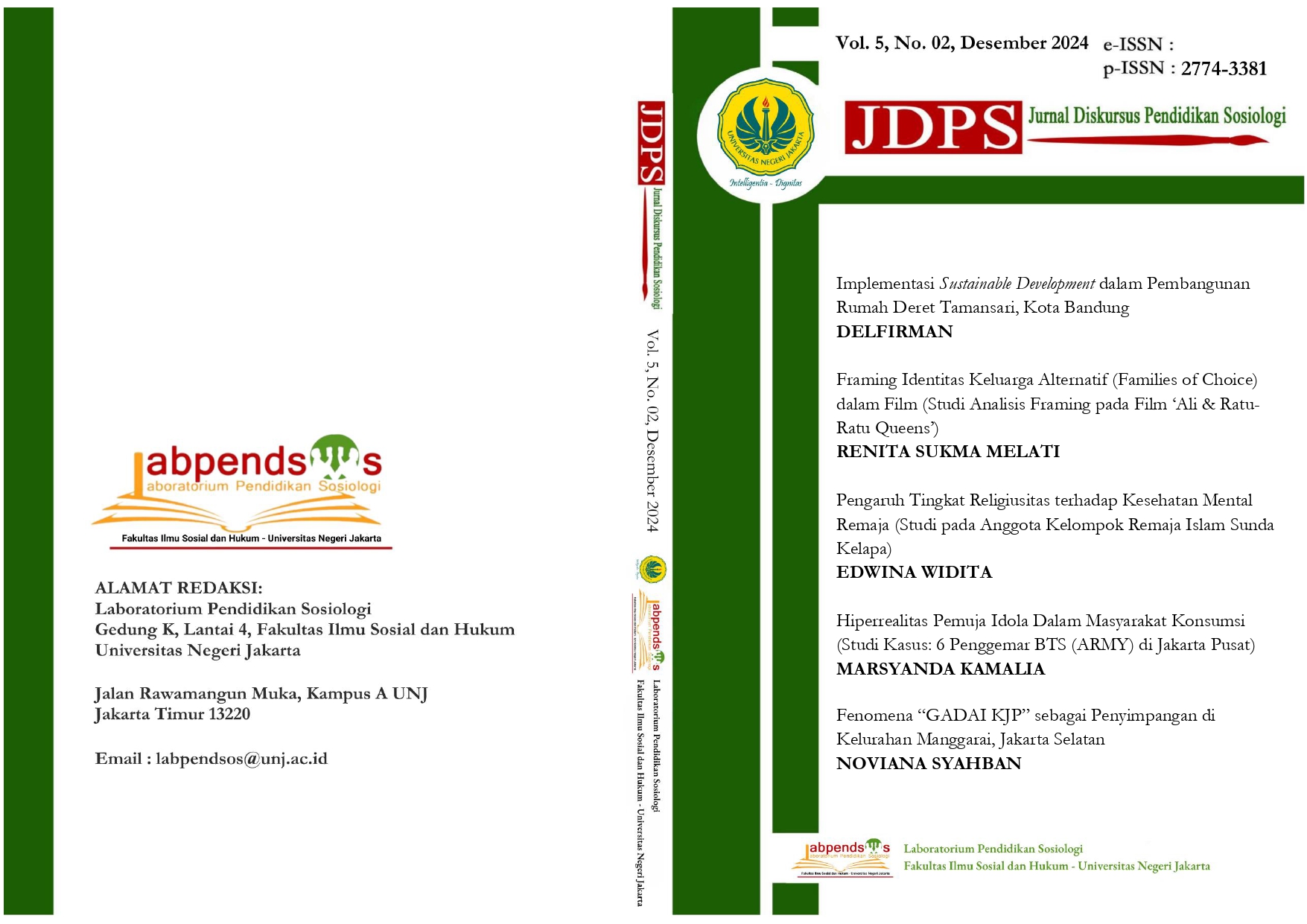Implementasi Sustainable Development dalam Pembangunan Rumah Deret Tamansari, Kota Bandung
Keywords:
Sustainable, Development, Informal Settlements, Slums, Bandung City, Row HouseAbstract
Penanganan permukiman kumuh termasuk dalam agenda SDGs 11, yang berupaya untuk menghapus ketimpangan dalam hak akses terhadap hunian layak di perkotaan. Namun, kebanyakan pendekatan yang dilakukan dalam penanganannya di kota-kota besar di Indonesia, termasuk Kota Bandung adalah dengan slum upgrading dan memindahkan permukiman ke tempat lain dengan relokasi. Pendekatan ini seringkali menyebabkan kondisi masyarakat justru semakin terpuruk, karena tidak pernah dilibatkan dalam proses perubahan dan pembangunan yang dilakukan. Melalui pendekatan penelitian kualitatif dengan metode studi kasus, artikel ini berupaya untuk menganalisis masalah yang dihadapi untuk menerapkan prinsip pembangunan berkelanjutan dalam Pembangunan Rumah Deret di Tamansari. Penanganan permukiman informal dengan pendekatan yang lebih bersifat partisipatif dibutuhkan untuk menjamin keberlanjutan hidup masyarakat di permukiman kumuh. Masyarakat perlu dilibatkan dalam membangun komunitasnya mulai dari perencanaan hingga pemeliharaan lingkungan permukiman yang baru, Namun, implementasi pembangunan permukiman yang berkelanjutan dapat sangat beragam tergantung kondisi masyarakat dan visi pemerintah setempat dalam menangani kemiskinan perkotaan serta masalah lingkungan yang sesuai tujuan pembangunan berkelanjutan.
Kata Kunci: Pembangunan Berkelanjutan, Permukiman Informal, Permukiman Kumuh, Bandung, Rumah Deret
Abstract
Slum upgrading is included in SDG 11, which seeks to eliminate inequalities in the right of access to adequate housing in cities. However, most of the approaches taken in handling slums in big cities in Indonesia, including Bandung City, are slum upgrading and moving settlements to other places by relocation. This approach often causes the community's condition to worsen, because they are never involved in the process of change and development. Through a qualitative research approach with a case study method, this article seeks to analyze the problems faced to implement the principles of sustainable development in the development of Rumah Deret in Tamansari. Settlement management with a more participatory approach is needed to ensure the sustainability of people's lives in slums. Communities need to be involved in building their communities from planning to maintenance of the new settlement environment. However, the implementation of sustainable settlement development can vary greatly depending on the conditions of the community and the vision of the local government in addressing urban poverty and environmental issues in accordance with sustainable development goals
Keywords: Sustainable Development, Informal Settlements, Slums, Bandung City, Row House
References
Abdullah, Sait, Deni F Ramdhani, R Iyoega, and Solahuddin Bin Ismail. 2023. “CosmoGov: Jurnal Ilmu Pemerintahan ‘WHO HAS GOT WHAT’: The Political Economy of Land Conflict in Local Development.” Cosmogov: Jurnal Ilmu Pemerintahan 9 (1). https://doi.org/10.24198/cosmogov.v9i1.45836.
Aboulnaga, Mohsennm, Monaaf Badran, and Maiim Barakat. 2021. Resilience OffInformal Areas in Megacities-Magnitude, Challenges, and Policies: Strategic Environmental Assessment and Upgrading Guidelines TooAttain Sustainable Development Goals. Switzerland: Springer.
Ar-Ridho, Ali, and Ishartono. 2019. “KONFLIK KEPENTINGAN LAHAN WARGA RW 11 TAMANSARI DENGAN PEMERINTAH KOTA BANDUNG DALAM KASUS REALISASI PROGRAM RUMAH DERET.” Jurnal Kolaborasi Resolusi Konflik 1 (2).
El-Haggar, Salah, and Aliaa Samaha. 2019. “Sustainable Slums Communities.” In Advances in Science,
Technology and Innovation, https://doi.org/10.1007/978-3-030-14584-2_10. 159–67. Springer Nature.
Indrakesuma, T. 2012. “The slum problem: Not as easy as it seems”. Asian trend monitoring blog http://www.asiantrendsmonitoringblog.com/2012/02/16/the-slum-problem-not-aseasy-as-it-seems/
Jones, Paul. 2017. “Formalizing the Informal: Understanding the Position of Informal Settlements and Slums in Sustainable Urbanization Policies and Strategies in Bandung, Indonesia.” Sustainability (Switzerland) 9 (8). https://doi.org/10.3390/su9081436.
Kusyala, Dibya, Asep Darmana, and Yusin Lim. 2018. “Unconventional Approach to Housing Design and Construction Practice in Indonesia and Its Challenges.” In Engaging Architectural Science: Meeting the Challenges of Higher Density: 52nd International Conference of the Architectural Science Association 2018, edited by P Rajagopalan and M.M Andamon, 115–20. The Architectural Science Association and RMIT University.
Nurdiansyah, Alfian. 2018. “Urban Slum Upgrading Policy In Jakarta (Case Study: Kampung Deret Program Implementation).” The Indonesian Journal of Planning and Development 3 (1): 19. https://doi.org/10.14710/ijpd.3.1.19-31.
Pane, Annisa, Budhi Gunawan, and Susanti Withaningsih. 2023. “Development of Kampung Susun Akuarium Based on Sustainable Housing Principles.” Sustainability (Switzerland) 15 (11). https://doi.org/10.3390/su15118673.
Sari, Shanisa Berliana Indah. 2022. “SENGKETA WILAYAH TAMANSARI, BANDUNG DALAM PERSPEKTIF ASAS UMUM PEMERINTAHAN YANG BAIK.” Lontar Merah 5 (1). https://ejournal.unsrat.ac.id/index.php/administr.
Suhardiman, Andang, Ely Sufianti, and Sait Abdullah. 2022. “Model Penanganan Konflik Lahan Dalam Proyek Pembangunan Rumah Deret Tamansari Kota Bandung.” In Konferensi Nasional Ilmu Administrasi.
Tyler Miller, G. 1994. “Living in the environment: Principles, connections and solutions (8th ed.)” Belmont, California, Wadsworth Pub. Co., Wadsworth biology series.

Downloads
Published
How to Cite
Issue
Section
License
Copyright (c) 2024 Delfirman

This work is licensed under a Creative Commons Attribution-NonCommercial-ShareAlike 4.0 International License.
- Authors retain copyright and grant the journal right of first publication with the work simultaneously licensed under an Attribution-NonCommercial-ShareAlike 4.0 International (CC BY-NC-SA 4.0) that allows others to share the work with an acknowledgment of the work's authorship and initial publication in this journal.
- Authors are able to enter into separate, additional contractual arrangements for the non-exclusive distribution of the journal's published version of the work (e.g., post it to an institutional repository or publish it in a book), with an acknowledgment of its initial publication in this journal.
- Authors are permitted and encouraged to post their work online (e.g., in institutional repositories or on their website) prior to and during the submission process, as it can lead to productive exchanges, as well as earlier and greater citation of published work.

.png)
.png)
.png)
1.png)










